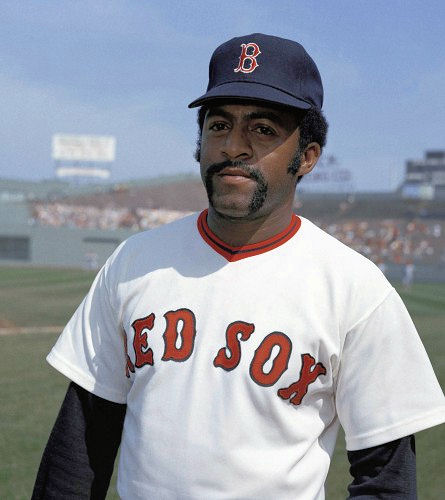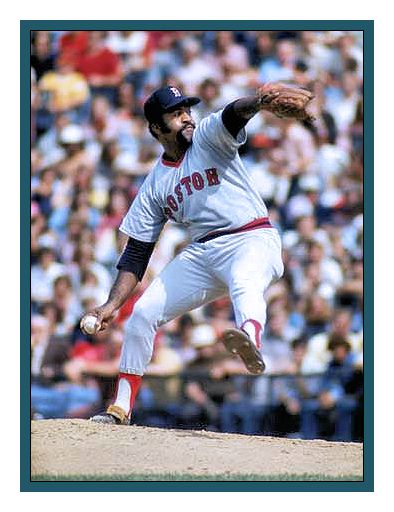|
“FENWAY'S BEST PLAYERS”  |
|||||
Luis Tiant won 229 games over parts of 19 seasons in the major leagues. His mid-career comeback and World Series heroics left him one of the most beloved men ever to play for the Red Sox. After failing a tryout with the Havana team of the International League, Luis started his professional career in 1959, at age 18, for the Mexico City Tigers. During these seasons, Luis spent his summers living in Mexico City, returning to Havana for the off-season to play winter ball and be with his family. Unfortunately, at that time Fidel Castro banned all outside travel. So upon the advice of his father, Luis did not return home to Cuba, not knowing when or if he would see his parents again. At the end of the 1961 season, the Cleveland Indians purchased his contract. Luis pitched for Charleston in the Eastern League and had a respectable year. In 1963, for Burlington, he was likely the best pitcher in the Carolina League, finishing 14-9, including a no-hitter, with a 2.56 ERA, leading the league in strikeouts and shutouts. He was 23 years old, and presumably one of the prizes of the Cleveland farm system. Despite a good spring in 1964, the Indians first sent him back to Burlington, but an injury to a pitcher on their Triple-A Portland team brought Luis to the Beavers for the 1964 season. Luis was not in the rotation, but quietly built up his own resume and was 12-1 in June and the Indians recalled him the next month. He finished his minor league season, 15-1 with a 2.04 ERA. He finished 10-4 for the Tribe with a 2.83 ERA. Luis was afflicted with a sore pitching arm in 1965 but started the 1966 season with three consecutive shutouts and his five shutouts topped the American League. In 1968, Luist became a star, finishing 21-9 and posting a league-leading 1.60 ERA, and also led the league with nine shutouts, including four in succession. In December of 1969, Luis was traded to the Minnesota Twins. In 1970 he won his first six decisions, but he left after his sixth victory with a sore shoulder that had been bothering him since the spring. He went to see a specialist, who found a crack in a bone in his right shoulder and prescribed only rest. He sat for 10 weeks. By spring training of 1971, Luis claimed to be fully recovered but soon pulled a muscle in his rib cage and missed two weeks. He was otherwise ineffective and in March the Twins gave him his unconditional release. The sole team willing to give him a shot was the Atlanta Braves, who signed him to a 30-day trial with their Triple-A Richmond team. After limited work, the Braves were unwilling to promote him at the end of the trial period, so Luis signed with Louisville, the Red Sox' Triple-A affiliate. He pitched very well for Louisville with a 2.61 ERA and was called up not the Red Sox in June. But Luis was not an immediate success. He remained in the rotation, but he dropped his first six decisions as a starter. Luis finally threw seven quality innings against the Yankees but lost 2-1 on a two-run home. He then threw ten shutout innings against the Twins. Manager Eddie Kasko finally took him out of the rotation in early August and pitched better in the bullpen. In March 1972, the Red Sox traded Sparky Lyle to the Yankees so Kasko elected to keep Luis for the team's bullpen. He became effective in a variety of roles - the occasional spot start, a ninth-inning save, or in long relief stint. In August at Fenway Park, Luis started and beat the Orioles. One week later, he beat the Orioles again, pitching six no-hit innings before settling for a three-hitter. After a relief appearance, he pitched a two-hitter in Chicago, losing a no-hitter with two outs in the eighth. He was in the rotation to stay and had become one of the Red Sox best players. Luis finished with a record of 9-1, six shutouts, and a 0.82 ERA, all nine victories being complete games. He began with four straight shutouts, his streak of 40 scoreless innings ending during a four-hit victory over the Yankees at Fenway on September 8th. Luis blanked the Indians back home on the 16th and then before the second game of a two-night doubleheader against the Orioles a few days later, the fans rose to their feet as Luis walked to the bullpen to warm up the crowd started chanting "Loo-Eee, Loo-Eee, Loo-Eee". When he came up to bat in the bottom of the eighth on his way to another shutout, the crowd again rose to give him an ovation that continued throughout his at-bat, during the break between innings, and throughout the entire top of the ninth. Though he was essentially a relief pitcher for the first four months of the season, Luis finished 15-6 and won his second title with a 1.91 ERA and the "Comeback Player of the Year" award. By leading the Red Sox in an unexpected race for the pennant, Luis won the hearts of the Red Sox fans. He would never lose them. He continued his comeback by winning 20 games in 1973, and the next year Luis won his 20th by the end of August. Considered an MVP candidate at the time, he won only two of his final seven decisions. He finished 22-13 on the season with a league-leading seven shutouts in 1974. The Red Sox had recently been a fractured team, but Luis kept his teammates laughing, largely by making fun of them and himself. He called Yastrzemski "Polacko", Fisk "Frankenstein" and would play tricks on his best friend, Tommy Harper. Dwight Evans would later say, "Unless you've played with him, you can't understand what Luis means to a team." A barrel-chested man who looked fatter than he really was, Luis would often emerge from the shower with a cigar in his mouth, look at his naked body in the mirror, and declare himself to be a "good-lookeen sonofabeech." Luis struggled for most of the 1975 season and was seen more and more as an aging back-of-the-rotation starter. He had not seen his father in 14 years and in May 1975, Senator George McGovern made an unofficial visit to Cuba to see Fidel Castro. While it was not the reason for his trip, he carried with him a letter from his Senate colleague, Edward Brooke of Massachusetts, making a personal plea that Luis' parents be allowed to visit Luis in Boston. The very next day, Castro approved the request and put the diplomatic wheels in motion for a visit. After several delays and postponements, Luis' mom and dad landed at Logan Airport on August 21st. Luis embraced his father and shamelessly wept and later the Red Sox arranged for Luis's parents to be introduced to the crowd and for his father to throw out a ceremonial first pitch. After a prolonged ovation, the 69-year-old Tiant, standing on the Fenway Park mound adorned in a brown suit and Red Sox cap, took off his coat and handed it to his son. He went into his full windup and fired a fastball to catcher Tim Blackwell. The fans roared as he left the field. His son later commented, "He told me he was ready to go four or five." Luis' start, on September 16th, was the biggest game of the year and one of the legendary games in the history of Fenway Park. The hard-charging Orioles, now 4-1/2 games out, were in town and Jim Palmer faced Luis. Predictably, Luis pitched his first shutout of the year, a 2-0 five-hitter, and the crowd chanted all evening ("Loo-Eee, Loo-Eee, Loo-Eee"). Later in the month, he pitched another shutout against Cleveland, and the Sox won the pennant by four-and-a-half games. Luis was the obvious choice to start the first game of the divisional playoffs and he three-hit the Athletics to start a Red Sox sweep. One week later, he began the 1975 World Series with a five-hit shutout of the Cincinnati Reds. In Game #4, in perhaps the best performance of his career, Luis worked out of jams in nearly every inning and recorded a complete game 5-4 win. He could not hold a 3-0 lead in Game #6 however, and was finally removed trailing 6-3, before Bernie Carbo and Carlton Fisk bailed him out with legendary home runs. That postseason marked the peak of Luis' career. His family story, his charm and charisma, his unique pitching style, and, finally, his talent made him a national star. His parents never returned to Havana. They stayed with Luis for 15 months, until his father died of a lingering illness in December 1976. Two days later, while resting for the next day's memorial service, Luis' mother Isabel died in her chair, although she had not been ill. Luis had won 21 games for a struggling Red Sox team in 1976 and had a protracted holdout in the spring of 1977. He came to terms but managed only 12 and 13 wins over the next two years and his relationship with the team's management was strained from that point forward. After the Red Sox stunning slump late in the 1978 season, Luis won in Toronto, and the Red Sox went on to win their last eight games, including two more victories from Luis on three days' rest. On the final day of the season, the Red Sox needed a win and a Yankee loss to force the playoff game. The Yankees lost in Cleveland and Luis dazzled the Blue Jays with a two-hitter. His September-October record for the Red Sox was 31-12. In the off-season, the Red Sox management offered Luis only a one-year contract, so he left and went to play for the Yankees. Yaz said he cried when he heard the news.
After the 1980 season, the
Yankees released him. He signed
with Pittsburgh in 1981, but
spent most of the season with
his old team in Portland but was
released at the end of the
season. He finished up his major
league career with six games for
the 1982 Angels, with his final
win coming against the Red Sox.
|
|||||

